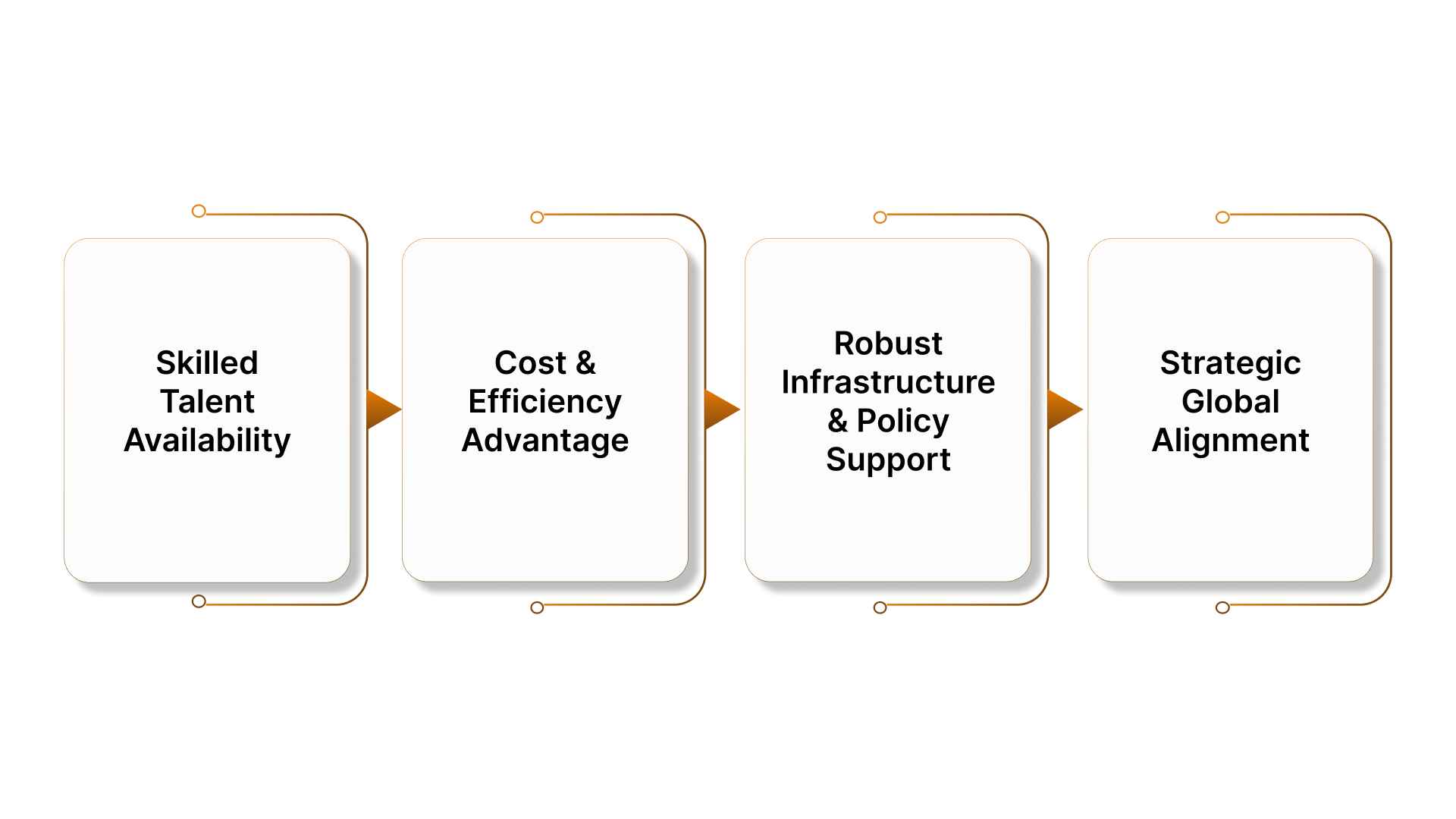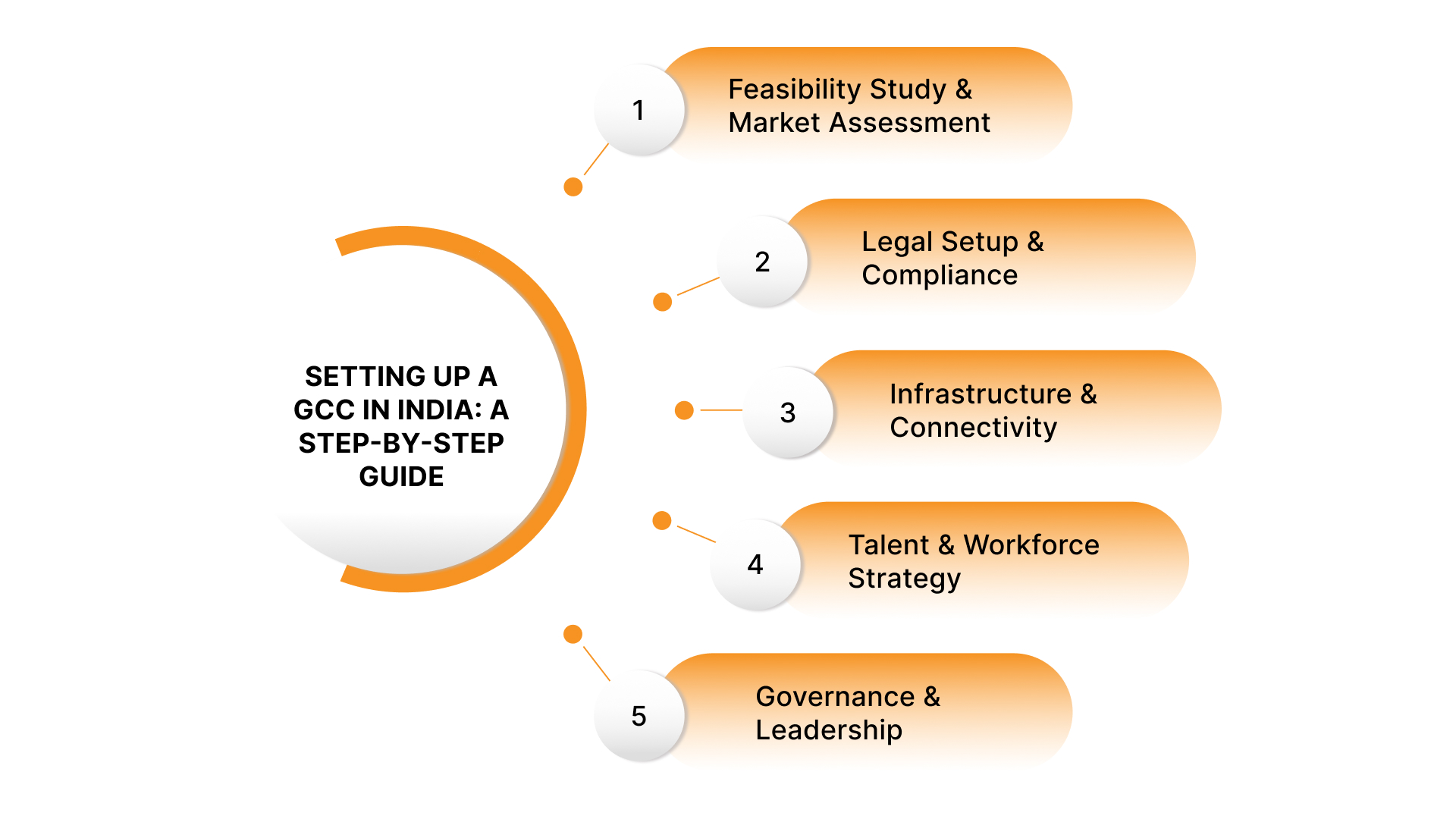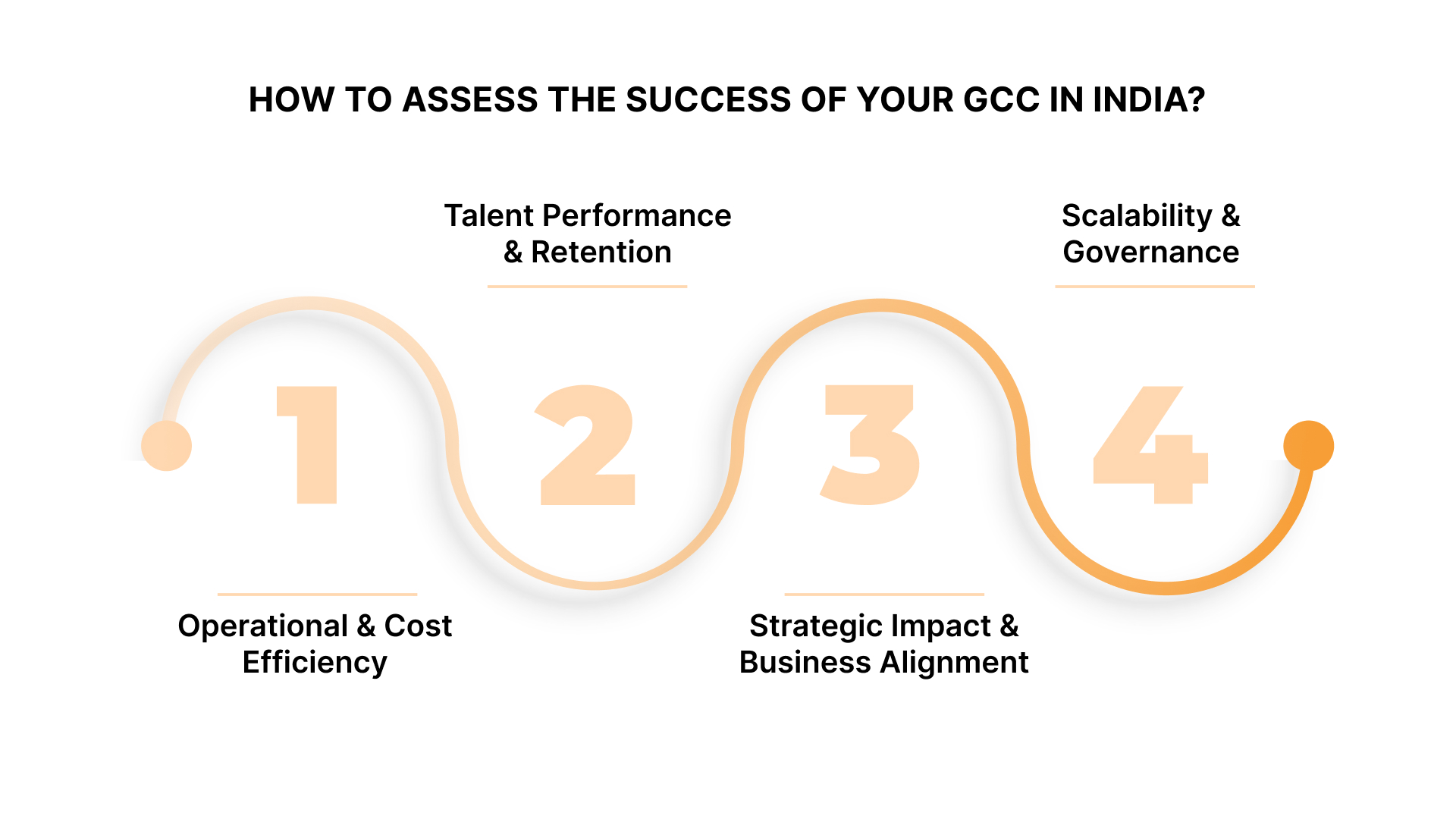India’s GCC ecosystem is growing rapidly, with over 1,580 centres employing more than 1.9 million professionals across technology, finance, analytics, and R&D.
For many global companies, these centres are no longer just extensions of back-office functions. They now play a strategic role in driving digital transformation, process excellence, and product innovation.
This trend has made India the preferred destination for GCC expansion. But the key question for leaders today is how to set up a GCC that delivers both efficiency and long-term strategic value.
In this article, we outline the essential steps, challenges, and best practices for setting up a GCC in India effectively.
Key Takeaways
- Setting up a GCC in India offers global companies long-term capability building, access to skilled talent, and significant cost advantages.
- India continues to lead as a global GCC hub, supported by strong infrastructure, favourable policies, and a large pool of engineering and analytics talent.
- A successful GCC setup depends on workforce planning, compliance alignment, and scalable hiring strategies tailored to business objectives.
- As GCCs expand into innovation and strategy hubs, workforce partners play a vital role in ensuring agility, talent continuity, and scalable growth.
What Global Capability Centres (GCCs) Represent Today?
A Global Capability Centre (GCC) is a centralised hub established by multinational organisations to manage business functions such as technology, finance, HR, analytics, and R&D.
Unlike outsourcing models, these centres operate as in-house extensions of the parent company, maintaining full control over quality and strategic alignment.
Before you begin building your centre, it’s important to understand the value it can deliver. Setting up GCC in India offers multiple advantages for global enterprises:
- Centralised efficiency: GCCs bring key functions together under one governance model, improving standardisation, visibility, and operational control.
- Talent and capability access: Companies gain direct access to India’s skilled talent base across engineering, analytics, and business operations, supporting both scale and innovation.
- Cost optimisation: Operating costs, including salaries, infrastructure, and overheads, are significantly lower compared to Western markets, allowing savings to be redirected to high-value activities.
- Innovation and digital transformation: Modern GCCs go beyond process delivery, managing advanced projects in product development, data science, and AI-led automation.
- Global integration: These centres align seamlessly with corporate objectives, enabling faster decision-making, improved compliance, and real-time collaboration across regions.
And typical functions managed through GCCs include:
- Technology and software development (cloud, DevOps, product engineering)
- Data science, analytics, and AI
- Finance, accounting, and procurement
- HR operations and shared services
- R&D, engineering, and design support
With this structure, GCCs play a key role in helping enterprises achieve both efficiency and innovation goals.
At V3 Staffing, we partner with organisations setting up or expanding GCCs in India by providing talent strategies that align with growth goals.
Our services in permanent recruitment, contract staffing, executive search, and RPO help companies build skilled teams that can scale with precision and stability.
Now that we’ve covered what GCCs represent and why they matter, let’s move to the key reasons global enterprises choose India for their GCC setup.
Why Are Global Enterprises Setting up GCCs in India?

India has become a global hub for setting up Capability Centres, offering unmatched access to skilled talent, modern infrastructure, and cost efficiency. Here’s why global organisations increasingly choose India to scale their GCC operations with confidence.
- Skilled Talent Availability: With a steady supply of STEM and management graduates, India offers a large, technically proficient workforce. GCCs here now manage advanced functions such as R&D, digital transformation, and analytics.
- Cost and Efficiency Advantage: Salaries, real estate, and operating expenses in India are lower than in most Western regions, enabling cost optimisation while maintaining delivery quality and agility.
- Robust Infrastructure and Policy Support: India’s digital infrastructure, reliable connectivity, and favourable state and central policies, such as SEZ benefits and tax incentives, create a supportive environment for GCC establishment and scale.
- Strategic Global Alignment: India’s geographic and time-zone advantages enable 24×7 operations, seamless collabouration across regions, and access to emerging markets in Asia-Pacific, the Middle East, and Europe.
Also Read: Top HR Consultancy and Recruitment Services
With the reasons laid out, we now turn to choosing the right location in India, an essential part of your planning.
Top Cities to Consider When Setting Up GCC in India
Selecting the right city for your GCC directly influences talent access, costs, and scalability. Each hub brings unique advantages that shape workforce strategy and operational success.
- Bengaluru: India’s top GCC hub with deep talent pools in engineering, R&D, and technology. Ideal for innovation-driven roles and digital transformation functions.
- Hyderabad: A fast-growing centre for product engineering, cloud, and analytics with competitive costs and strong government support. Well-suited for large-scale hiring processes and digital capability building.
- Pune: Known for its manufacturing, IT-BFSI, and engineering talent. Offers a balanced mix of affordability, infrastructure, and skilled professionals.
- Chennai: Preferred for stable workforce availability and lower attrition, making it suitable for long-term GCC operations and support functions.
- Mumbai and Delhi NCR: Major hubs for financial services, consulting, and leadership talent. While costs are higher, they provide access to senior professionals and strong corporate ecosystems.
- Emerging Tier-II Cities: Locations like Jaipur, Kochi, Indore, and Bhubaneswar are gaining traction due to lower costs, improving infrastructure, and untapped talent pools ideal for scalable or hybrid GCC models.
When you evaluate cities, use criteria such as:
- Availability of required skills (tech, analytics, domain specialists)
- Competitive cost of real-estate, office space, infrastructure
- Proximity to airports, connectivity and ease of travel
- Local labour market dynamics (attrition rates, talent supply)
- Government and state-level incentive programme
- Quality of life and attractiveness to talent (which affects retention)
These factors help you balance cost-effectiveness and long-term sustainability. If your centre is designed for scale and you prioritise cost efficiency, an emerging city may make sense.
Once you have identified the right city, the next step is to focus on execution, setting up your GCC in India efficiently and sustainably.
Step-by-Step Process for Setting Up GCC in India

Setting up GCC in India requires structured planning, regulatory clarity, reliable connectivity, and a strong workforce strategy. Each stage plays a critical role in building a centre that delivers both operational and strategic value.
Here’s a step-by-step approach:
Step 1: Conduct a Detailed Feasibility Study and Market Assessment
Start by outlining your business goals, defining the functions your GCC will handle, and estimating the return on investment. A feasibility study should analyse talent availability, cost structure, real estate, and infrastructure readiness.
Cities like Bengaluru, Hyderabad, Pune, Chennai, and Gurugram are preferred for their skilled workforce and business-friendly environment.
With an established presence across India’s major GCC hubs, V3 Staffing provides workforce insights, salary data, and hiring feasibility reports that help you make well-informed setup and staffing decisions.
Step 2: Set Up the Legal Entity and Plan for Regulatory Compliance
Select the most suitable operational model, such as a captive centre and Build-Operate-Transfer (BOT), or Joint Venture.
Ensure your entity is incorporated and aligned with Indian labour laws, FDI policies, data privacy standards, and tax regulations. Since compliance requirements vary by state, early legal consultation is essential.
Step 3: Build Infrastructure, Technology, and Connectivity
Your GCC’s infrastructure must be future-ready. Secure scalable office space that promotes collabouration and productivity. Establish IT systems that meet global cybersecurity and data protection standards.
Reliable network connectivity is vital for real-time collabouration with global teams and hybrid work operations.
Step 4: Develop a Scalable Talent and Workforce Strategy
Define your staffing plan for both Permanent and temporary roles. Identify critical skills required in emerging areas like cloud, analytics, and AI. Build retention strategies that prioritise employee growth, engagement, and work-life balance.
Align global HR policies with local culture to maintain a unified team environment.
Step 5: Establish Governance, Leadership, and Cultural Integration
Create a clear governance model that defines reporting structures, performance KPIs, and accountability mechanisms. Strong leadership ensures that the GCC’s goals align with the parent organisation. Promoting collabouration, open communication, and knowledge sharing builds a cohesive culture across geographies.
By focusing on these key steps and partnering with trusted experts like V3 Staffing, your GCC can achieve faster setup, reliable operations, and sustainable workforce growth in India’s top business hubs.
After setting up your centre, ensuring it functions efficiently and scales sustainably becomes the next challenge. Let’s look at what leading companies do right.
Challenges and Best Practices for Building a Successful GCC in India
Building a Global Capability centre (GCC) in India offers global enterprises access to skilled talent, cost efficiency, and innovation capabilities. Yet, the process involves overcoming specific challenges related to the workforce, compliance, and long-term scalability.
Here’s a closer look at the key challenges and how leading organisations successfully address them.
1. Talent Availability and Retention
India’s major GCC hubs like Bengaluru, Hyderabad, Pune, and Chennai are highly competitive talent markets. Demand for digital, data, and engineering skills often exceeds supply, leading to higher attrition and longer hiring cycles.
Best Practice: Build a strong employer brand and offer career growth, global exposure, and learning opportunities.
Partnering with V3 Staffing helps address niche talent gaps through curated hiring, domain-aligned recruitment, and retention-focused hiring practices.
2. Regulatory Complexity and Cultural Integration
labour laws, tax regulations, and FDI norms vary by state. In addition, aligning the Indian centre’s culture with headquarters while maintaining operational consistency can be difficult.
Best Practice: Partner with local legal and compliance experts for smooth operations. Promote cross-border collabouration through leadership rotations, shared goals, and transparent communication to strengthen cultural alignment.
3. Cost Management and Scalability
Although India offers cost advantages, hidden costs such as high attrition, re-hiring, infrastructure upgrades, and delayed transitions can affect budgets.
Best Practice: Create a scalable operating model that combines cost control with flexibility. Use workforce planning tools, multi-location hiring, and hybrid work models to maintain agility.
4. Governance and Accountability
Many GCCs struggle with unclear reporting lines and decision-making structures, which can slow performance and limit autonomy.
Best Practice: Establish a governance framework that clearly defines ownership, KPIs, and review mechanisms. Encourage operational independence while maintaining alignment with global business objectives.
5. Technology Readiness and Data Security
Maintaining global standards for cybersecurity, cloud infrastructure, and compliance is critical for credibility and business continuity.
Best Practice: Invest in robust IT infrastructure, secure cloud systems, and strict data privacy protocols. Align with global standards like ISO 27001 and GDPR for compliance and trust.
6. Capability Building and Innovation
GCCs often begin as process or support centres but must transform into innovation and strategy hubs to deliver higher value.
Best Practice: Introduce continuous learning programmes, university partnerships, and exposure to global projects. Encourage employees to work on R&D, automation, and AI-led solutions to build strategic capabilities.
When approached strategically, these practices help transform GCCs in India into high-performing centres of excellence in driving efficiency, innovation, and business growth for global enterprises.
Once the centre is operational, measuring its success becomes essential to guide continuous improvement and strategic alignment.
Also Read: 5 Ways Recruitment Agencies Can Tackle High Attrition Rates
How to Measure the Success of Your GCC in India?

Once a Global Capability Centre (GCC) in India is operational, success must be assessed using metrics that reflect both business outcomes and workforce effectiveness. Tracking measurable performance indicators helps organisations strengthen governance, improve decision-making, and align the GCC’s goals with corporate priorities.
To understand how well your GCC is performing, evaluate factors such as:
- Operational and Cost Efficiency: Monitor cost savings, process cycle times, productivity levels, utilisation rates, time-to-market, and delivery against SLAs to assess overall efficiency.
- Talent Performance and Retention: Track hiring speed, quality service delivery, attrition rates in key roles, employee engagement, internal promotions, and talent mobility to measure workforce strength.
- Strategic Impact and Business Alignment: Evaluate how the GCC supports corporate priorities such as innovation outcomes, analytics contributions, customer satisfaction, revenue growth, and global role absorption.
- Scalability and Governance: Review the centre’s ability to expand into new functions or regions, maintain compliance with local regulations, uphold SLA commitments, and sustain transparent reporting.
With a solid understanding of how to measure GCC performance, the next focus area is finding the right partner to help you hire and scale effectively.
How V3 Staffing Supports Companies Setting Up GCCs in India?
V3 Staffing provides end-to-end hiring solutions to help global enterprises establish and expand their Global Capability centres in India. Each service is designed to support the unique workforce and scalability needs of GCCs across India’s leading business hubs.
- Permanent Recruitment: Focused sourcing for mid-to-senior roles to ensure stability and alignment with your long-term business goals.
- IT Staffing: Access to a highly skilled pool of technology talent, including software developers, data engineers, and cloud specialists essential for building GCC capabilities.
- Contract and Temporary Staffing: Flexible hiring models that enable quick team deployment for new projects and transitions, without adding permanent headcount.
- Recruitment Process Outsourcing (RPO): Dedicated recruitment teams working on-site or remotely with SLA-based delivery, helping HR functions stay agile and efficient.
- Executive Search: Strategic hiring support for leadership roles, connecting you with CXOs, VPs, and Directors who bring both global experience and local market insight.
With deep domain expertise and a strong presence across India, V3 Staffing helps companies setting up GCCs in India scale faster, maintain compliance, and build a workforce ready for global delivery excellence.
Conclusion
The growth of Global Capability centres (GCCs) in India is transforming how multinational companies approach expansion, innovation, and talent development. For business leaders, aligning recruitment strategies with long-term goals is essential for building sustainable success rather than short-term gains.
Partnering with an experienced hiring partner makes it easier for HR leaders to stay focused on business priorities while managing hiring needs with accuracy.
If your organisation is planning or considering setting up GCC in India, V3 Staffing can help you build capable teams and achieve your hiring goals with confidence.
Contact us today to learn how our customised workforce solutions can support your GCC setup and expansion in India.
Frequently Asked Questions
Q. How can I start setting up GCC in India?
A. Begin by defining your GCC’s purpose, choosing the right city, and registering your business entity. Partnering with experts familiar with recruitment, compliance, and local operations speeds up the process.
Q. Which locations are ideal for setting up GCC in India?
A. Hyderabad, Bengaluru, Chennai, Pune, Delhi NCR, and Mumbai remain top choices due to strong infrastructure and deep talent pools. Tier-II cities are emerging as cost-effective alternatives.
Q. How long does it take to setting up GCC in India?
A. Typically, the setup takes 4–6 months depending on hiring, legal, and infrastructure readiness. Working with local staffing specialists can shorten this timeline.
Q. What type of workforce model works best for GCCs?
A. A mix of permanent recruitment, contractual staffing, and RPO helps maintain flexibility while scaling operations quickly and sustainably.
Q. What are the main hiring challenges when setting up GCC in India?
A. Organisations often face talent shortages in niche roles, high attrition, and extended hiring cycles, areas where a recruitment partner adds real value.
Q. What industries benefit most from GCCs in India?
A. BFSI, IT, engineering, and shared services lead the way, using GCCs for analytics, software development, and back-office operations.




